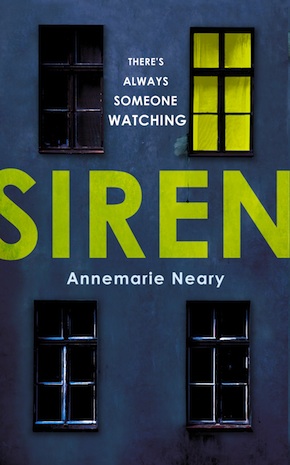Scenes from a Troubles childhood
by Annemarie Neary
“Annemarie Neary’s beautiful and crisp writing cuts to the bone, a rarity in psychological thrillers.” Claire Fuller
“Where do you get your ideas?” Or, to paraphrase, “You look like a pretty normal person to me, so where did all that come from?” It’s the baseline question, the one we’ve all been asked.
Often, the questioner is really asking something more specific: “How much of your book is written from life?” or “Did you experience any of that yourself?” or “Are your characters proxies for real people?”
In the case of Siren, the answers to the second and third questions are easy – no and no. But the first gives me pause for thought. Siren is not based on any personal experience, at least not in a literal sense. However, that’s not to say it’s all made up.
During the Northern Ireland Troubles, most of childhood – mine included – was routine, nondescript. Bad things happened to other people. But even a child knew there was no guarantee the luck would hold; after all, the news was crammed with happenstance, from random attacks to no-warning bombs.
Those things weren’t happening to me, of course. I stayed lucky. But highly coloured versions of them lodged in my mind like virtual memories. Alongside ‘real’ life ran a kind of hyperreality comprising vividly envisioned episodes, alternative lives, nightmare scenarios that might one day unfold if the luck ran out.
Years later, when it came to writing fiction, that habit of understanding events by trying to imagine them came in useful. But imaginative empathy is just one ingredient when it comes to fiction. Emotional truth is another. And that’s where lived experience comes in.
When writing about the Troubles, ‘real’ life provided the emotional fodder for what are entirely fictitious occurrences. None of these childhood scenes from ‘real’ life has found its way into my fiction, but they are everywhere beneath the skin of it.
Scene 1
Your mother’s car is parked on a narrow street, one of those dark November afternoons. You’re in the back seat with a bag of liquorice torpedos and a copy of Bunty, impatient for your sister to finish her piano lesson. Next door, at the rentals and repair shop, two men have just unloaded a television set from a battered red van. You notice the comical stagger of their feet as they struggle into the shop. That telly must be heavier than you’d think. And then the men are out again. Running now. Yelling at the whole world to eff off out of it. Someone is banging at the car window, and your sister and the piano teacher scramble into the back seat, piling in on top of you. Your mother puts her foot down, and the car screeches off like something from a movie. But the bomb doesn’t go off. Not right away. Not then.
Troubles child that you are, you learn that life is random, that chance is everything. You learn that the greatest good fortune is not to be in the wrong place at the wrong time.”
Scene 2
You are doing your homework to Radio Luxembourg while army helicopters drone and clatter overhead. One day, your mother always says, they’ll shave the roof off. As dusk falls, there is movement over by the blackberry hedge. A patrol, bristling with static, is passing silently up into the long grass where the sandpit is, through the bent apple trees with their bitter fruit, and out into the fields beyond. You wonder, almost casually, if there are more helicopters than usual. From the high bathroom window that overlooks the town, you can count four fires tonight. But one of them is hungrier than all the rest; it is wild and high and stretches from the cathedral tower all the way to the dark line of the canal. And when you realise what’s happening, you mourn your hometown’s burnt-out heart.
Scene 3
The latest hunger striker to die is a local man and the streets are hung with limp black flags. Your sister has a Rubik’s Cube in her schoolbag, and she wants to show her friends how quickly she can solve it now. But there’s hardly anyone else at school that day. One of the teachers has to leave by the back door, though no one explains why. Your sister is sent home early. As she walks towards your father’s office, she is daydreaming. She doesn’t notice what’s about to happen until she’s in the middle of it.
On the other side of the street, tucked in beside the newspaper offices, soldiers are shooting up over her head at the gunmen returning fire from the roof of the flats. Your sister just sits by the side of the road with her head between her knees and her schoolbag hugged to herself and waits for it to end. She thinks about the Rubik’s Cube and hopes she can still solve it when everyone is back at school tomorrow. She doesn’t realise yet that not all endings are happy ones.
Scene 4
Swingball and lawnmowers and ice cream. A jumble of kids, rolling down a grassy hill, picking up pollen and burrs. Your father warns you to stay out of the treehouse – there have been patrols that morning, moving up towards the back field, and you don’t want to be mistaken for a sniper. Mid-afternoon, your brother and his friend are looking for Smarties. They pedal away on the choppers they’ve barely learnt to ride. Off to the petrol station shop they’re not supposed to visit on account of the thundering road they have to cross to get there. And it’s another man this time. Another bomb. Your brother and his friend run up the hill. They are the lucky ones. This time, they choose right. But they still see what happens to the bomber who gets it wrong.
And so, Troubles child that you are, you learn that life is random, that chance is everything. You learn that the greatest good fortune is not to be in the wrong place at the wrong time. Earlier than most, you understand that everything can blow away in the blink of an eye. And if that doesn’t turn you into a writer, nothing will.
 Annemarie Neary’s novels include Siren (2016) and The Orphans (coming June 2017), both from Hutchinson. Her short stories have been published in many places in Ireland, the UK and the US, most recently in The Glass Shore: Short Stories by Woman Writers from the North of Ireland. Her awards for short fiction include the Michael McLaverty, Bryan MacMahon, Columbia Journal and Posara prizes. She lives in London with her family. The paperback edition of Siren is published by Windmill Books on 23 February. Read more.
Annemarie Neary’s novels include Siren (2016) and The Orphans (coming June 2017), both from Hutchinson. Her short stories have been published in many places in Ireland, the UK and the US, most recently in The Glass Shore: Short Stories by Woman Writers from the North of Ireland. Her awards for short fiction include the Michael McLaverty, Bryan MacMahon, Columbia Journal and Posara prizes. She lives in London with her family. The paperback edition of Siren is published by Windmill Books on 23 February. Read more.
annemarieneary.co.uk
@AnnemarieNeary1

